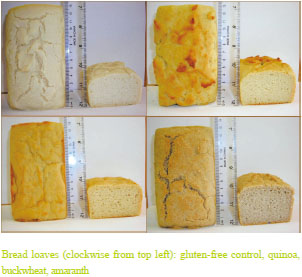 NUTRITIOUS and tasty gluten-free breads for coeliac disease sufferers can be produced using the so-called 'pseudocereals' amaranth, quinoa and buckwheat to replace wheat in bread formulations. These cereals are gluten-free, and are also rich in nutrients; therefore, their incorporation in the gluten-free diet could not only add variety but also improve nutritional quality. "Greater public awareness and improved diagnostic procedures have combined to highlight the prevalence of coeliac disease and gluten intolerance in the general population, which is estimated to affect 1 per cent of the population. The only accepted treatment for coeliac disease is a strict, life-long elimination of gluten from the diet," explains Dr Eimear Gallagher, Teagasc Food Research Ashtown (Ireland), who is leading the research project. Although gluten-free alternatives are readily available in the market, these products are often characterised by a crumbly, brittle texture, and are perceived as being of inferior quality compared to the wheat products they are intended to replace. In addition to quality defects, gluten-free foods are also characterised by an inferior nutritional quality. This is mainly due to the fact that gluten-free products are generally formulated with starches and refined flours, and are not usually fortified.
NUTRITIOUS and tasty gluten-free breads for coeliac disease sufferers can be produced using the so-called 'pseudocereals' amaranth, quinoa and buckwheat to replace wheat in bread formulations. These cereals are gluten-free, and are also rich in nutrients; therefore, their incorporation in the gluten-free diet could not only add variety but also improve nutritional quality. "Greater public awareness and improved diagnostic procedures have combined to highlight the prevalence of coeliac disease and gluten intolerance in the general population, which is estimated to affect 1 per cent of the population. The only accepted treatment for coeliac disease is a strict, life-long elimination of gluten from the diet," explains Dr Eimear Gallagher, Teagasc Food Research Ashtown (Ireland), who is leading the research project. Although gluten-free alternatives are readily available in the market, these products are often characterised by a crumbly, brittle texture, and are perceived as being of inferior quality compared to the wheat products they are intended to replace. In addition to quality defects, gluten-free foods are also characterised by an inferior nutritional quality. This is mainly due to the fact that gluten-free products are generally formulated with starches and refined flours, and are not usually fortified. Gluten-free and nutritious
Researchers addressed some of the nutritional needs of coeliacs by formulating palatable, gluten-free breads with enhanced nutritional properties. Amaranth, quinoa and buckwheat when incorporated in the gluten-free diet could not only add variety but also improve nutritional quality, they said. "All pseudocereal-containing gluten-free breads had a significantly softer crumb in comparison with the gluten-free control. Nutritional studies revealed that gluten-free breads containing pseudocereals had significantly higher levels of protein and dietary fibre in comparison with the gluten-free control. The nutritional value of these breads was also in line with the existing nutritional recommendations for coeliac diets and coeliac products. Also, all of the pseudocereal breads showed significantly higher antioxidant activity and polyphenol content compared with the gluten-free control," explains Dr Gallagher. Antioxidants prevent food oxidation during cooking and storage, and can also protect the body from degenerative diseases. Dr Gallagher said these projects have yielded novel information, which will help to provide the industry with healthy, viable alternatives to the more traditional approaches in gluten-free formulation and baking. (the end)Nike Air Max 2017
 iConnectHub
iConnectHub
 Login/Register
Login/Register Supplier Login
Supplier Login



























